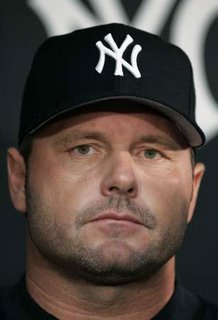Clemens Answers Questions with More Questions

Watching and reading about Roger Clemens and his latest press conference to (supposedly) clear his name of his (alleged) steroid use actually did (very) little to satisfy anyone who sought closure on the matter.
The reasoning throughout this press conference and his 60 Minutes interview was essentially circular. It got us nowhere.
Why not be definitive, Roger? Former trainer Brian McNamee may have ruined your legacy, your status as age-defying, as all-empowered, and as an other-wordly workhorse. You even admitted how hard your family is taking this situation.
Again, why not definitively answer questions? Why not call for McNamee to step forward and admit to lying?
When questioned by Mike Wallace on 60 Minutes, Clemens said, "Where did I get [steroids]? Where is the person out there [who] gave them to me? Please, please come forward." Now, tell me honestly -- if you didn't watch this interview, and I didn't tell you who was speaking, who would you assume was asking those questions. Roger Clemens, the interviewee? Or perhaps Wallace, the interviewer?
Thought so.
Clemens later asked, "How can you prove your innocence?"
Over two decades in the public eye, and you'd think he'd understand how the interview process works.
Later still, Clemens said, "Why didn't I keep doing it if it was so good for me? Why didn't I break down?"
I don't know, Roger. Why don't you tell us? Better yet, why not call McNamee to the press conference to explain why he lied? After all, he offered in that phone conversation to fly to Houston and meet with Clemens.
If I were on the defense for something I'd done (and if I had a total disregard for anything larger than myself), I'd be doing the exact same thing as Clemens. The press conference was a game. He ended his answer whenever he wanted and called on somebody else. By answering with a question, all he did was keep everything purely hypothetical. He did nothing to definitively silence doubters.
Many pundits feel the same way I do. Among them is ESPN's Gene Wojciechowski, who walks readers through Clemens' logic vs. the reality of the situation quite well:
Five different scouts were dispatched [in 1996, when Boston let him go,] to assess what the then-34-year-old Clemens had left. The consensus: He was all but done.
Clemens' resurgence mirrors the approximate time he began working closely with McNamee. It also generally corresponds to the years McNamee said he injected Clemens with steroids (1998) and steroids and human growth hormone (2000, 2001). Clemens won the American League Cy Young in 1997, 1998 and 2001.
I want to believe Clemens. I really do. I want to believe that I witnessed somebody performing at almost supernatural levels (and for my favorite team for a few years, no less). But I can't shake the facts mentioned above by Wojciechowski. The Rocket's return to greatness lines up too well with McNamee's story.
And I absolutely, positively cannot shake the fact that any other rational person would have been fed up with the questions surrounding his legacy enough to pull out all the stops.
So stop feeding us questions, Roger. We've got enough of our own.

0 Comments:
Post a Comment
<< Home